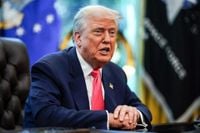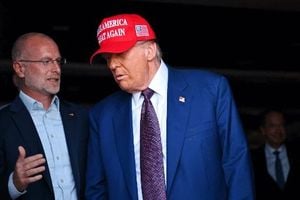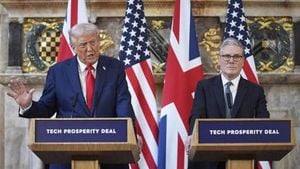In a move that has sent ripples across both corporate boardrooms and the halls of government, the Trump administration has implemented a sweeping new system to rate American companies and trade associations based on their loyalty and support for President Donald Trump’s signature legislative agenda, most notably the so-called “One Big Beautiful Bill” (OB3). The scorecard, confirmed by multiple outlets including Axios, Bloomberg, and Common Dreams, ranks 553 companies and trade associations as strong, moderate, or low supporters, and is already influencing how the White House interacts with corporate America.
The origins of this loyalty rating system are as transactional as they are political. According to Axios, the White House began circulating the scorecard to senior staff as a tool to “see who really goes out and helps vs. those who just come in and pay lip service,” as one senior official put it. The ratings are based on a variety of engagement metrics: social media posts, press releases, video testimonials, advertisements, attendance at White House events, and other forms of public support for OB3 and related Trump administration initiatives.
“If groups/companies want to start advocating more now for the tax bill or additional administration priorities, we will take that into account in our grading,” a White House official told Benzinga, highlighting the evolving nature of the scorecard. The system is expected to expand, eventually covering corporate engagement with other presidential priorities beyond OB3.
OB3 itself is a sprawling piece of legislation that extends and expands tax cuts from Trump’s first term, while also providing billions in additional funding for immigration enforcement, as reported by Bloomberg. The bill has been touted by the administration as a boon for American industry, and the White House has not been shy about rewarding companies that demonstrate enthusiastic support.
Examples of “good partners” abound. Axios and Common Dreams both list Uber, DoorDash, United, Delta, AT&T, Cisco, Airlines for America, and the Steel Manufacturers Association as companies receiving high marks on the loyalty list. Their support has been anything but subtle. DoorDash deliverer Maliki Krieski, for instance, wore a red “DoorDash Mom” T-shirt while standing behind President Trump at a White House event promoting OB3, and later plugged the “no tax on tips” provision in a Fox News Digital interview. Uber, for its part, celebrated the new law on its driver blog: “No Tax on Tips is now law... you won’t pay federal income taxes on your tips that are reported to the IRS on a 1099 form.”
Corporate leaders have also taken to social media to express their gratitude. Chuck Robbins, CEO of Cisco and chair of the Business Roundtable, posted on X: “Encouraged by the House #reconciliation package’s corporate tax provisions. By preserving a competitive rate, retaining FDII, & restoring immediate R&D expensing, this bill will strengthen America’s pro-growth tax system — allowing US companies to better innovate & invest at home.” AT&T announced plans to accelerate fiber infrastructure rollouts, directly attributing the move to the pro-investment policies in the OB3 Act. Airlines for America, representing major U.S. airlines, praised the bill’s $12.5 billion investment in FAA modernization, with United and Delta both issuing supportive statements. The Steel Manufacturers Association declared that the megabill “will allow manufacturers to buy new equipment, to further their lead in research and development, to raise wages and improve employee benefits. Most importantly, this legislation will allow our members to create more jobs.”
But the benefits for loyal companies appear to extend beyond public praise. Public Citizen, a nonprofit consumer advocacy group, reported that the Trump administration has already withdrawn or halted enforcement actions against 165 corporations since the start of Trump’s second term—about one in four of them from the technology sector. At least 104 tech companies were facing 142 federal investigations and enforcement actions at the start of the term, but around one-third of these have now been dropped or suspended. The report highlights that technology companies spent $1.2 billion on political influence during and since the 2024 elections, with $352 million attributed to Elon Musk alone.
Tech giants such as Amazon, Apple, ByteDance, Google, Meta, OpenAI, Snap, Uber, and Musk-led firms like The Boring Company, Neuralink, SpaceX, Tesla, X, and xAI have all benefited from the administration’s deregulatory blitz, according to Common Dreams. Apple CEO Tim Cook, for example, presented President Trump with a 24-karat gold-based plaque after securing an exemption from a 100% chip tariff and announcing a $100 billion investment in domestic production. Nvidia CEO Jensen Huang, who has met with Trump multiple times in 2025, praised the president’s “visionary” policies and efforts to re-industrialize U.S. technology manufacturing.
The loyalty scorecard has not been without controversy. Critics, including Democratic officials and progressive commentators, have labeled it “authoritarian” and warned of the dangers of government retaliation against dissenting corporations. Rachel Barnhart, a Democratic member of the Monroe County, New York Legislature, called it, “Just one authoritarian thing after another.” Common Dreams reported that companies failing to praise or openly criticizing Trump’s policies could face government retribution—a concern echoed by business journalist Bill Saporito, who wrote in The New York Times that “in ripping up numerous business regulations, Donald Trump seems intent on replacing them with himself.”
The White House, meanwhile, appears to view the scorecard as a pragmatic tool for managing its relationships with the business community. The internal spreadsheet, as described by Axios, is used by senior aides as a “reality check” when companies seek favors or regulatory relief. The administration’s approach has encouraged some CEOs to go above and beyond in their displays of support. Apple’s Tim Cook not only presented a gold plaque but also donated $1 million to Trump’s inaugural fund, while Nvidia’s Jensen Huang publicly lauded the president’s economic vision.
For companies, the stakes are clear: those who align themselves closely with the administration’s priorities may find regulatory burdens eased and doors opened, while those who hesitate or criticize may face a chillier reception. The scorecard itself is a living document, updated as companies adjust their public stances and advocacy efforts in response to shifting political winds.
As the Trump administration continues to wield the loyalty list, the boundaries between public policy and private enterprise are being redrawn in real time. Whether this approach will deliver lasting benefits for American workers and consumers—or simply entrench the influence of the already powerful—remains an open question. But one thing is certain: the era of corporate America’s transactional politics has reached a new, highly visible threshold.





